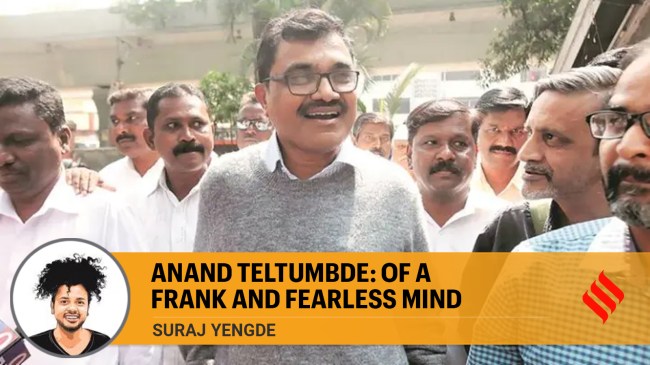Opinion Anand Teltumbde: Of a frank and fearless mind
Teltumbde helped us to foreground the meaning of atrocity. Among his notable scholarly contributions to social sciences are his monographs covering the state and the political economy.
 Dr. Anand Teltumbde (Express File Photo)
Dr. Anand Teltumbde (Express File Photo) Anand Teltumbde is a rare intellectual, someone gifted with a versatility that cuts across disciplines. He’s among the top-ranking intellectuals of contemporary India. Much like the late British historian Eric Hobsbawm, he is someone who can easily play with multiple topics and engage intelligently.
Teltumbde’s is an honourable name among the list of this column’s predecessors. In his column Margin Speak, which he wrote for the Economic & Political Weekly, he demonstrated the quality and merit that flow in the lineage of India’s talented people disdained by the arresting assault of caste.
Teltumbde’s articles carried the weight of data, argument, and contemporaneity. Most importantly, they were unafraid to speak. It is only Teltumbde who could take on the state and politics stylistically, something that irritated many.
Teltumbde’s text on the 2006 Khairlanji atrocity was heart-wrenching. He collated data by visiting the site of the atrocity and analysed its cause, reaching the conclusion that neoliberal policies clubbed with Hindutva were the cause of many of these atrocities. Teltumbde helped us to foreground the meaning of atrocity. Among his notable scholarly contributions to social sciences are his monographs covering the state and the political economy.
Teltumde is an introvert. As much as he is a shy person, he doesn’t shy away an inch when it comes to talking about the politics he believes in.
Anand is a sought-after intellect whose new writings are awaited in the marketplace of debates. Several campus dialogues and private scholarly conversations are based on his ideas. Anand is a casualty of his time. He grew up at a time when change was visible and not criminalised. It was a moment of revolutionary pronouncements.
Anand’s greatest asset is his family and the background he hails from. It is a rarity for someone who took birth in a landless labourer’s womb in the untouchables’ quarters of Rajur village, in Yavatmal’s Wani, to rise to become the sparkling titan of his field. Very few have managed to do what Anand has done in his life. Anand’s story is complete with his wife Rama by his side.
His early exposure to revolutionary literature kept him critically engaged. He sharpened the tools of his mind by probing into the terrains of blasphemous territories. The fragile, traditionalist camp of the Dalit movement took objection to Anand’s vocal ideas. They accepted him as a Leftist thinker mimicking the Left’s tone of unleashing his critique upon an entire community. As a writer, he took positions over several years and at times, these were unpopular, but that was his hard-earned right.
Teltumbde called out those who didn’t make the lives of the poor and the regular people dignified. He found value in the Marxist maxim as well as in Ambedkar and Buddha. He was equally critical of either ideology, but the attack was against the system. By staying on what he saw as the right side of history, Teltumbde battled with many diverging interests.
We often forget that his core area of expertise lies in cybernetics, which is touted in the present era as the dawn of AI. Teltumbde charted new paths into this new-age technology in 1993 when he earned his PhD from the University of Mumbai. Besides, he was an ace management student at IIM-A and a C-class executive in India’s state petroleum company. He then went on to teach at the IIT Kharagpur and founded the nation’s first data science programme at the Goa Institute of Management. I have yet to come across a corporate success story like Teltumbde’s, who has returned to the roots trying to ameliorate the condition that he was born into.
What a great travesty for the nation that a mind like Teltumbde is forced to stay muted. He follows the pursuit of truth-seeking and trades in plain speak. His energy and erudition must be boiling like volcanic lava, and we need to let that loose so the nation can assess its warranty. I have missed Anand’s take on many matters in the past four years.
I recently met him at Rajgruha. His health is as fit as one can imagine of a person who has unjustly spent 31 months in gaol. The tragedy of such an act is that unfairness was paraded in the cabaret of moral schooling. Teltumbde is a winner for his maddened courage. He stands on the side of history that will judge once an epoch is passed for the next generations to sit back and assess. Fortunately, that generation is around and is praiseworthy of the man’s work. I count myself in that league.
Suraj Yengde, author of Caste Matters, curates Dalitality and is currently at Oxford University




